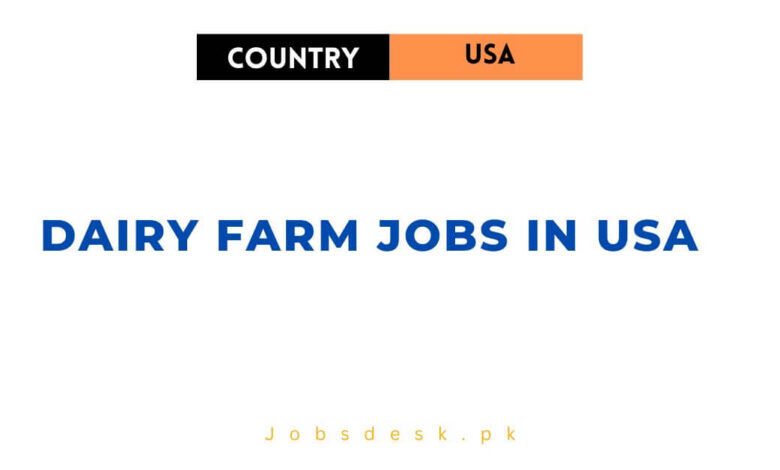Dairy Farm Jobs in USA 2024 – Visa Sponsorship

Visa-sponsored dairy farm positions in the United States provide exceptional prospects for those in search of employment within the agricultural industry. The duties of these positions generally include overseeing farm equipment, feeding animals, and nursing cows, among others. Visa sponsorship enables foreign workers to investigate rewarding professional opportunities within the dynamic dairy sector of the United States.
This endeavor not only tackles the issue of labor scarcity but also fosters cultural interchange and diversity among agricultural personnel. Prospective candidates have the opportunity to enhance their knowledge of the country’s illustrious agricultural heritage while simultaneously contributing to the American dairy industry; this arrangement is advantageous for employers and employees alike.
Check Also: Visa Sponsorship Orchard Worker Jobs in USA 2024
Living and Working Conditions
Employment in the dairy farming industry frequently entails living on or near the farm, thereby offering a distinctive rural lifestyle. Employees may be granted access to dairy products produced on the farm and can partake in a strong sense of community.
Future Outlook
Anticipated to endure is the need for proficient labor on dairy farms in the United States, thereby sustaining continuous employment prospects. Additionally, technological advancements may impact the skill set necessary for particular positions on contemporary dairy farms.
Types of Dairy Farm Jobs in USA:
- Farm Manager: Supervises daily operations, supervises personnel, and ensures the efficient administration of the dairy farm.
- Milker/Herdsman: Entrusted with the responsibility of cow milking, herd health monitoring, and execution of routine dairy production duties.
- Feed Technician: Oversees the preparation and distribution of feed and ensures that the dairy livestock receives adequate nutrition.
- Veterinary Technician: Provides aid in the management of animal health, including medication administration and livestock health monitoring.
- AI Technician: An expert in artificial insemination who ensures the genetic integrity of herds and optimizes breeding programs.
- Machinery Operator: Performs maintenance and operation of agricultural machinery, such as tractors and other equipment utilized in daily operations.
- Quality Control Inspector: Ensures compliance with safety protocols, monitors the purity of milk, and supervises hygiene procedures on the farm.
- Calf Raiser: Supervises the development and maintenance of calves, ensuring that they mature into productive, healthy dairy cows.
- Administrative Assistant: Assists with administrative duties, record-keeping, and documentation about the dairy farm’s operations.
- Research and Development Specialist: Concentrates on increasing the efficacy of dairy production via research and the application of new technologies.
Qualifications ofDairy Farm Jobs in USA:
- Educational Background: Generally, experience in animal science, agriculture, or a closely related discipline is favored.
- Experience in Dairy Farming: Proficiency in dairy husbandry, encompassing an understanding of health protocols, milking procedures, and herd management.
- Physical Fitness: Physical stamina is required for dairy farm work; candidates must be able to perform manual labor and operate in a variety of weather conditions.
- Animal Welfare Knowledge: A comprehension of the fundamentals of animal welfare and a dedication to safeguarding the health and welfare of dairy cattle.
- Operational Skills: Expertise in the operation and upkeep of agricultural apparatus and equipment.
- Attention to Detail: Ensuring accuracy in activities such as feeding, milking, and herd health surveillance is vital for the overall prosperity of the farm.
- Communication Skills: Efficient communication is critical for coordinating duties and promptly addressing issues, particularly in a team environment.
- Adaptability: Adaptability to the ever-changing demands of the dairy farming industry, such as fluctuations in workload caused by the seasons.
Responsibilities and Tasks:
- Milking Operations: Implement streamlined and sanitary milking procedures to safeguard the well-being and output of the dairy herd.
- Animal Health Monitoring: Consistently inspect and communicate the condition of dairy cattle, discerning indications of ailment or distress.
- Feeding and Nutrition: Effectively oversee feeding schedules to guarantee a well-balanced diet that promotes maximum milk production.
- Equipment Maintenance: Implement regular upkeep on agricultural apparatus and equipment to avert any disturbances to daily activities.
- Record Keeping: Uphold precise documentation of herd health, milk production, and additional pertinent information.
- Barn and Facilities Maintenance: Barns, milking parlors, and additional facilities should be kept sanitary and in good condition.
- Assist in Breeding Programs: Foster productive breeding programs through alliances with breeding specialists.
- Team Collaboration: Collaborate effectively with fellow farm personnel to accomplish operational objectives while preserving a harmonious workplace atmosphere.
Benefits of Dairy Farm Jobs:
- Hands-On Experience: Practical Experience Gaining practical experience in animal care, milking, feeding, and general farm operations is an asset of working on a dairy farm. Those who are interested in pursuing careers in agriculture or animal science must possess this practical knowledge.
- Career Prospects: The dairy farming industry presents a wide array of professional trajectories, encompassing positions such as agricultural consultants, nutritionists, veterinarians, and farm managers. Beginning positions on dairy farms function as transitional pathways to more senior positions within the sector.
- Stability in Employment: The dairy farming sector benefits from job security due to the enduring demand for its products. The dairy industry will continue to require dairy producers and laborers as long as consumers continue to purchase dairy products.
- Competitive Compensation: In regions where the dairy industry is robust, dairy farm laborers generally receive wages that are competitive in nature. Furthermore, certain dairy farms provide housing assistance, health insurance, and retirement plans as employee benefits.
- Educational Prospects: The dairy farming industry encompasses an extensive array of responsibilities, including equipment and facility management and animal care. Employees are afforded the chance to acquire knowledge and develop new skills in fields including animal nutrition, health, pasture management, and machinery operation.
- Connection to Nature: By working on a dairy farm, individuals are afforded the opportunity to experience the rhythms of pastoral life and establish a connection with nature. For many individuals, spending time in nature, tending to animals, and observing the changing of the seasons can provide personal fulfillment.
- Community Engagement: Dairy farms frequently support community events and initiatives and contribute significantly to the local economy in rural communities. There may be opportunities for employees to interact with customers, residents, and other community members.
- Physical Activity: Dairy farming is a physically strenuous occupation that requires lifting, transporting, and operating machinery, among other things. For individuals who derive pleasure from being in nature and engaging in physical activity, employment on a dairy farm can offer a gratifying and dynamic way of life.
- Sense of Purpose: A sense of purpose underpins the activities of many individuals who produce food for their communities and interact with animals. By ensuring the welfare of dairy animals and contributing to food production, dairy farm occupations provide a sense of purpose and fulfillment.
- Family Tradition and Legacies: Dairy farm labor may constitute an ongoing family tradition and legacy for members of agricultural families. Many dairy producers preserve agricultural heritage by imparting their expertise and knowledge to future generations.
Visa Sponsorship Opportunities
Certain dairy farms in the United States recruit competent laborers from abroad and provide visa sponsorship to address labor shortages. The H-2A visa program is frequently utilized by foreign nationals to work on U.S. farms for a specified period as temporary agricultural laborers.
Application Process:
- One may submit applications to dairy farms directly or investigate potential employment prospects via agricultural job forums and websites.
- In addition to participating in interviews and submitting a resume, the application process may require the demonstration of pertinent skills.
Conclusion:
Opportunities exist for individuals with a passion for agriculture and a desire to work in a rewarding industry to obtain dairy farm positions in the United States. Visa sponsorship programs facilitate the integration of foreign laborers into the American dairy farming sector, enabling them to contribute their expertise and promote a dynamic and heterogeneous labor force. Prospective candidates should familiarize themselves with the visa application process, investigate available opportunities, and be ready to confront the rigors and rewards of a dairy farming career.
Frequently Asked Questions:
-
Is a dairy farm profitable in the USA?
This statistic shows the income made by U.S. farms from dairy products from 2010 to 2022, with a forecast. At the end of 2022, farms’ cash receipts from dairy products, or income, totaled around 57.3 billion U.S. dollars.
-
What’s on a dairy farm?
In developed countries, dairy farms typically consist of high-producing dairy cows. Other species used in commercial dairy farming include goats, sheep, water buffaloes, and camels. In Italy, donkey dairies are growing in popularity to produce an alternative milk source for human infants.
-
What is an American dairy farm?
(DFA) is a national milk marketing cooperative in the United States. DFA markets members’ raw milk and sells milk and derivative products (dairy products, food components, ingredients, and shelf-stable dairy products) to wholesale buyers both domestically and abroad.



